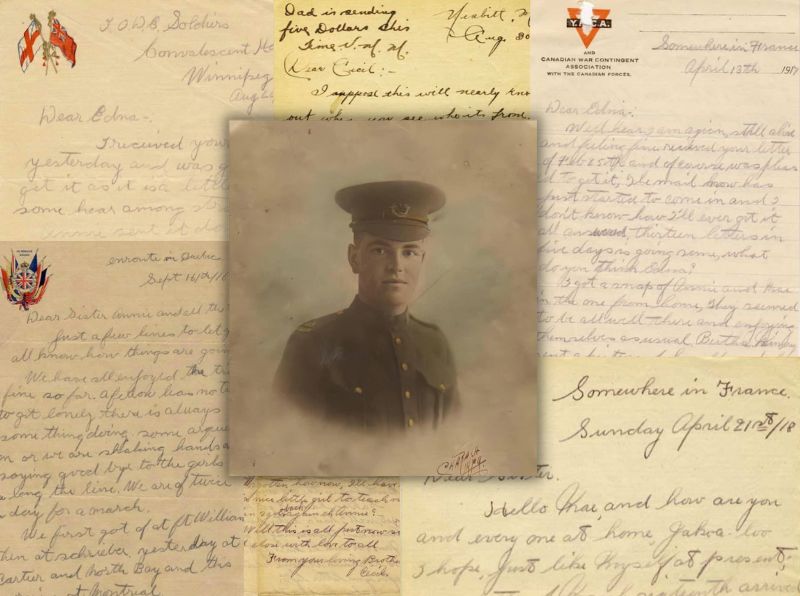We asked the Forces War Records community to share letters from their military ancestors, and you didn’t disappoint. In our latest blog, Letters from my ancestor, we explore the letters of Cecil Minary, who served with the Canadian Expeditionary Force (CEF) during WWI.
Letters: a great source for family historians
Many of us are lucky enough to have letters from our military ancestors in our family history collections. They often provide valuable insight into their wartime experiences, their thoughts, opinions and sometimes, their hopes once the war was over. For family historians, letters can be invaluable, offering clues like a person’s number and regiment or dates and locations to help research them in the records. Do you have a box in your attic containing family memorabilia? Perhaps there’s someone in your family who has kept your ancestor’s letters and photos safe. Why not delve into your family history collection and explore where it takes you? One person who did just that was Kendra Minary, who discovered the wartime letters of her great-great uncle, Cecil Minary.
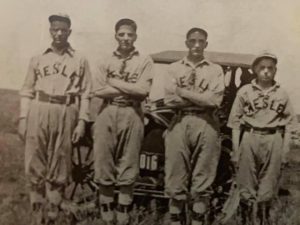
Cecil Edmund Minary
Cecil was born in Nesbitt, Manitoba, in 1895, the eldest son and one of seven children of Andrew Minary and Martha Patterson. Sadly, Martha died when Cecil was just nine years old. The Minarys were a farming family, with Cecil employed on the family farm. ‘The original homestead is still standing today, although abandoned’, says Kendra. ‘But it is a neat experience to be able to visit the home they grew up in and walk through the same door that Cecil once walked through, not knowing he would never return.’ Cecil and his brothers were also very involved with the local baseball team.
FWR Tip: Don’t forget to expand your tree like Kendra, and look for military stories among your aunts and uncles.
Cecil joins up
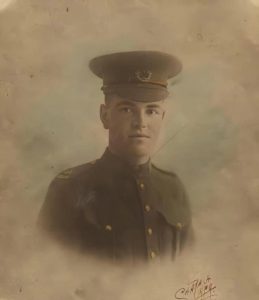
Canada was automatically drawn into WWI when Britain declared war on Germany on 4 August 1914. Early on, Canadians enthusiastically clamoured to enlist and do their bit for the war effort. Cecil’s service record, available on Forces War Records in our WWI Canadian Soldiers collection, provided valuable insight into his background and military service, helping us to piece together his story.
20-year-old Cecil enlisted in Winnipeg on 3 November 1915, at a time when the CEF still relied on volunteers. It was not until 1917 that the Canadian government introduced conscription.
FWR Tip: Whether you’re researching an ancestor from New Zealand, the UK, Canada or Australia, their service record is a great source for exploring their military service and understanding their wartime experiences. Discover your ancestors’ service records through Forces War Records.
Cecil was now in uniform, and his war had begun. But first, he would need to be moulded into the kind of soldier the CEF required. The hard, physical work of farm life may have stood Cecil in good stead for what awaited him. Research carried out by the Minary family, along with Cecil’s service record, helped us understand Cecil’s journey after enlisting:
‘While in early training at Camp Hughes, he very nearly died from pneumonia. In the days before antibiotics, it took him nearly seven and a half months to recover from it.’
Although this delayed his training, as the Minarys’ research indicates, Cecil recovered from his illness and was deemed fit for active service.
Cecil’s letters help us understand his wartime experience
Kendra was always aware that Cecil’s letters existed. While the original letters are housed at a local museum, a family member provided Kendra with scanned copies:
‘I originally started sharing them online along with some photos as Remembrance Day posts’, states Kendra, ‘and my family and friends were showing some interest in them so I decided to post them all on the anniversary of the days they were actually written on.’
After completing his training, Cecil wrote the following letter on 16 February 1916 to his eldest sister, Annie and the rest of his family while making his way to Halifax, ready to ship out to England:
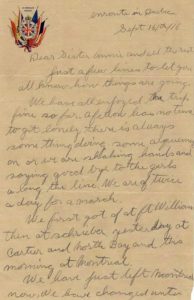
‘Dear Sister Annie and all the rest
Just a few lines to let you all know how things are going.
We have all enjoyed the trip fine so far, A fellow has no time to get lonely there is always something doing, some arguments, or we are shaking hands and saying good bye to the girls a long the line. We are of [sic] twice a day for a march.
We first got of [sic] at Ft William then at Schrieber yesterday at Cartier and North Bay and this morning at Montreal.
We have just left Montreal now, we have changed unto the grand trunk railway now. We will get into Halifax about this time tomorrow it is now 930 am.
That vaccination I got is beginning to work now, it is not sore yet it is just itchy. My gosh but the towns a thick here the farm building are about 200 yards a part.
Well Annie I don’t know weather [sic] I will be able to write before we embark or not so I will say good bye till I reach England. I only hope I do not get to sea sick.
So Bye Bye with love to all
From Cecil.’
Cecil arrived in England in late September 1916. The Minarys’ research notes that:
‘After further training, he was sent to France in January of 1917. He had been picked in a draft of 30 men to join the 52nd Battalion.’
Shortly after setting foot in France, Cecil penned a letter to his cousin, Edna on 6 February 1917:
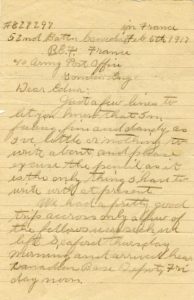
‘Dear Edna,
Just a few lines to let you know that I’m feeling fine and dandy as I’ve little or nothing to write about and please excuse the pencil as it is the only thing I have to write with at present.
We had a pretty good trip accross only a few of the fellows were sick we left Seaford Thursday morning and arrived here Canadian Base Depot Friday noon.
It is a lot colder hear [sic] than at Seaford as everything is frozen with some snow on the ground and we have only tents to sleep in although there are lots of Blankets and fourteen men in a tent make it not to [sic] bad at night.
We have done practically nothing hear [sic] yet although we were to start work today but snowed most of the time.
I was quite lucky in the mail line for I got six letters the night before we left Seaford one was from Margaret Smith and the rest were from Manitoba. This is rather short but its all I have to say at present. So will close with love to all.
Cecil.’
FWR Tip: Remember to consult war diaries when researching ancestors from Canada, the UK, Australia or New Zealand who served in the army. War diaries provide a day-to-day account of a battalion’s movements and can fill in the gaps left by letters. They can also tell you what your ancestor was experiencing around the days they wrote home. We have a selection of WWI war diaries available on Forces War Records.
The Minarys’ research shed light on how much time Cecil spent on the Western Front in the latter stages of the war:
‘Except for one furlough to England in December of 1917, it would appear that Cecil’s unit was continually in and out of the battle lines until at least August of 1918.’
1918: the final push to victory
In the summer of 1918, the Allies’ fortunes on the Western Front rapidly changed. On 8 August, the 100 Days Offensive was launched, pushing the Germans back across the battlefields, eventually leading to victory.
On 25 August, weeks into the Allied advance, Cecil wrote to his sister Annie. News of home and the familiar faces he had met in France were on his mind:
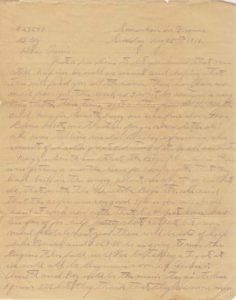
Dear Annie,
‘Just a few lines to let you know that I am still keeping as well as usual and hoping that this will find you all the same. There has been no mail from you this week so I won’t be writing a very long letter this time. I got a letter from Edna Blythe and Maggie Smith every one was fine down there. Edna wrote me thirteen pages, some letter eh? she was telling me her holiday experiences she must have had a great old time of it all by all accounts.
Maggie Smith said that the boys from home there were getting a months leave for every month that they had been in the army I don’t see why they couldn’t do that with the Manitoba Boys too. She said that the crops were very good I guess you will be all hard at work now with that big crop at home how are you off for help pretty short I suspect but never mind probley next year there will be lots of help like Bruce and I eh? Who is going to run the engine this fall will Vic be taking a try at it we will all be Engineers soon eh Annie? Arnott and Roy will be the main stay as stookees I guess I’ll bet they think that they are someone now I would like to hear Roy talk about it, is he just the same as he was?
There is nothing much from here only that the weather is still keeping fine and warm, Say Annie I met two more of the Boys from Wawanesa [14.5 kilometers east of Nesbitt] just after I had finished that last letter to you. A fellow come up to me and asked if I wasn’t a Minary, I knew his face but could not think who it was, it was Cecil McKibbon and so I got all the latest from Wawa, he is in the same Battalion as Roy Wallace. Roy is slightly wounded now and in Hospital. The other fellow I don’t think you would guess in a month of Sundays it was Jack Stephenson the kid who used to work in Chick Corries Drug Store a cousin of that friend of yours at Nesbitt. Ha Ha. Jacks just as jolly as ever and looking splendid for all the time he has been over here.
Well Annie, this is all for now so will close hoping to hear from you soon.
With love to all
Your loving Brother
Cecil.’
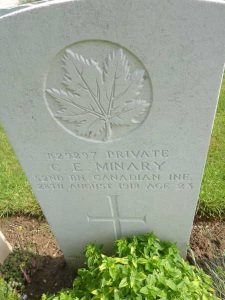
Three days later, Cecil was killed in action when a shell exploded amongst his seven-man machine gun crew, killing all but one of the men.
Cecil now rests in Vis-en-Artois British Cemetery, Haucourt, France. He is also named on his father’s headstone in Patterson Family Cemetery, Nesbitt, Manitoba.
Reflecting on Cecil’s letters, the Minarys poignantly conclude that:
‘There is little in his letters to suggest of the horrors and hardships we now know these men endured. In fact, he would appear to do his best to make light of it all. For anyone with enough time to read these letters, you will find that Cecil was a very fine young man. He was caught in a horrible war and was desperately hoping his luck would hold out until it all ended. To do the job he was sent to do and to see home, family, and friends was uppermost on his mind.’
The final word on Cecil’s story belongs to Kendra:
‘I have always had a strong love for and interest in war history, so it’s quite neat to be able to read Cecil’s exact experiences, in his own handwriting. You can read history books, and you can watch war movies, but having this more personal connection to the war makes it just a little more special. I’ve always hoped by sharing these letters that it would inspire others to dig into their own family war history. Or at the very least, take more time to respect our history, and to honour and thank our veterens. This history must never be forgotten.’
Perhaps our Letters from my ancestor blog has inspired you to research your family’s connection to the military?
Cover image: Letters and image of Cecil provided by Kendra Minary

